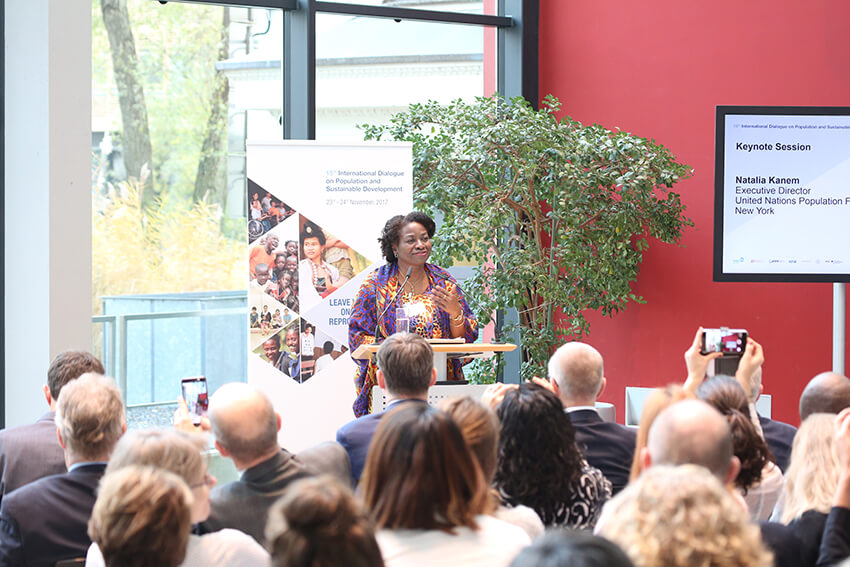Keynote Session

Keynote Speech by Natalia Kanem
Natalia Kanem, Executive Director of the United Nations Population Fund (UNFPA)
Advancing the rights of the most vulnerable for success on the 2030 Agenda
Natalia Kanem, the newly-appointed Executive Director of the United Nations Population Fund (UNFPA), delivered the conference’s keynote speech. “Our aim,” she said, “is to reach those furthest behind, who deserve happy, healthy sexuality, in the cycle of life, rebirth and regeneration”. Kanem reflected on her participation in the International Conference on Population and Development in Cairo in 1994, a moment she credited for creating a comprehensive set of principles, including an understanding of women’s rights and human rights, as well as the ‘primacy of SRHR’.
Progress since Cairo, but more to be done
“Despite all odds, we are making progress and we remain firmly committed to the proposition of working together to leave no one behind,” Kanem told the audience, adding that advancing the rights of young people, differently abled people and those displaced or living in fragile settings was a key to success in achieving the 2030 Agenda.
“Today, the chance of a woman dying due to pregnancy and childbirth complications have fallen by 45 per cent in the almost 25 years since Cairo. And for the first time in history, we have more than 670 million women and girls in developing countries who can now use modern contraceptives. Over three million unintended pregnancies are averted every single year.”
But Kanem urged delegates to accelerate the pace for young people, people with disabilities, and women and girls who are affected by violent conflict and suffer the most during war, natural disasters and political turmoil. The successes, she explained, don’t tell the whole story and too many continue to be left behind in an increasingly unequal world.
“Inequality is not just about money, it’s about power, opportunity and rights - including the right to sexual and reproductive health,” Kanem told the audience. “In most developing countries, it is the poorest women who have the least power to decide whether and with whom they are going to have a baby. They also have the least access to quality care during pregnancy and child birth.”
Conditions eradicated in wealthy nations, persist in vulnerable areas
Kanem offered the example of obstetric fistula, which she called “a tragic manifestation of our collective failure as a society and as a health system to protect the reproductive rights of the poorest, most excluded women and girls”. This traumatic injury ruptures the womb and is both preventable and treatable, but it persists because of weak health systems, poverty, gender inequality, early marriage and early child bearing.
She told the story of a woman who waited eight years to seek a surgical repair. The reason: it took her that long to save up the bus fare to the capital where the surgery was available. It is this woman, and the girl she was when she was married, that delegates were encouraged to remember in pursuit of the 2030 Agenda.
Again, Kanem returned to the theme of successes, which can be celebrated but not permitted to distract delegates from the continuing threats to the rights of the world’s most vulnerable people. She applauded the fact that, globally, new HIV infections have stabilised overall, at about two million per year. “The only cohort where we see a troubling increase in infections is adolescent girls and young women in Africa,” she said. “In many places, these girls lack access to the education and life saving information, lack agency and autonomy over their own bodies, often prevented from claiming their natural human rights.”
Renewing our commitments on SRHR
Turning to the work ahead, Kanem said it was time to “drastically ramp up our efforts” to reach those held back by legal and policy barriers, lack of information or discrimination. She turned with optimism to the young people in the room, expressing her joy to see so many included in this year’s dialogue. “You are 1.8 billion strong. You are the SDGs generation, who are going to make or break the sustainable development goals by the year 2030,” she said.
“Too many young people face barriers to getting sexual and reproductive health information and care, and it’s highly judgmental even when it’s accessible. Even when they do have the right information to figure out the clinic, be there at the right time and choose the services that are appropriate, there are discriminatory laws, practice and attitude. For young people with disabilities, it’s just compounded and navigating that terrain is even harder.”
Kanem pointed out that young people with disabilities face a triple challenge, because they are marginalised. “If you are disabled and you get raped, then society blames you for falling pregnant, and no one wants to be identified with a disabled pregnant girl,” she explained. She added that between 180 and 220 million young people aged 20 to 24 are living with mental, intellectual, physical or sensorial disability. Often, they live in isolation, deprived of access to basic services. For this reason, they are three times more likely to suffer physical, sexual or emotional violence.
“We live in a complex and challenging time,” Kanem told the room. “I firmly believe that we possess the experience and the imagination to overcome these challenges.”
“The inclusive and equitable approach that protects and respects everyone’s rights, including SRHR, will build resilience. To achieve the vision of the 2030 Agenda, greater investment in adolescent girls in particular is going to be essential.”
She closed by encouraging delegates to focus on leaving no one behind, to embrace inclusion and creative solutions, and to work with boys and men as well as religious community leaders to overcome current challenges.”